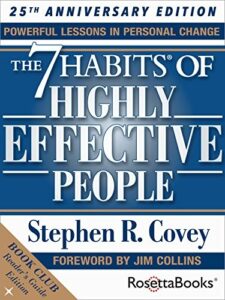
Question More, Action Knowledge.
Remember, at QMAK, we don’t just teach; we empower. We don’t just inform; we inspire. We don’t just question; we act. Become a Gold Member, and let’s unlock your child’s full potential, one question at a time.
 In our previous article, we explored the profound insights of Stephen Covey’s The 7 Habits of Highly Effective People, and their relevance for homeschooling families seeking to cultivate character, effectiveness, and fulfillment in their children.
In our previous article, we explored the profound insights of Stephen Covey’s The 7 Habits of Highly Effective People, and their relevance for homeschooling families seeking to cultivate character, effectiveness, and fulfillment in their children.
Building upon this foundation, we now delve into additional habits and practical strategies for nurturing these qualities and skills in our homeschooling journey.
One of the central themes in Covey’s work is the idea that to be truly effective, we must learn to prioritize and execute around our deepest values and aspirations, rather than getting caught up in the tyranny of the urgent or the expectations of others. As he writes, “The key is not to prioritize what’s on your schedule, but to schedule your priorities.” This habit of effective execution, which he calls “Put First Things First,” is about organizing and managing our time and energy in a way that enables us to focus on our most important roles and goals.
In the homeschooling context, this means being intentional about how we structure our days and design our learning experiences. Rather than simply reacting to the demands of the moment or the expectations of others, we can proactively create a rhythm and routine that reflects our family’s unique values, learning styles, and aspirations. This might involve setting aside dedicated time for core academic subjects, while also making space for passion projects, outdoor exploration, and unstructured play. It might mean saying no to certain extracurricular activities or social engagements in order to protect time for family connection and individual pursuits.
Covey suggests using a weekly planning process to identify our key roles and goals, and to schedule our time around our highest priorities. As homeschoolers, we can involve our children in this process, helping them to clarify their own values and aspirations, and to take ownership of their learning and growth. We can use tools like the Time Management Matrix to teach them how to distinguish between urgent and important tasks, and to make conscious choices about how they invest their time and energy.
Another key habit Covey teaches is the importance of thinking win-win—seeking mutual benefit and cooperation in our interactions with others, rather than approaching life with a competitive, scarcity-based mindset. As he explains, “Win-win is a frame of mind and heart that constantly seeks mutual benefit in all human interactions. Win-win means that agreements or solutions are mutually beneficial, mutually satisfying.”
In the homeschooling journey, a win-win mindset is essential for creating a positive, supportive family culture and for navigating the inevitable challenges and conflicts that arise. By teaching our children the value of cooperation, empathy, and creative problem-solving, we equip them with the skills to build strong, healthy relationships and to work effectively with others towards shared goals.
This might involve practicing active listening and perspective-taking in family discussions, and encouraging our children to look for ways to meet everyone’s needs in disagreements or decisions. It might mean involving them in co-creating family rules and agreements, and helping them to think creatively about how to balance individual needs with the greater good of the family. By modeling a win-win approach in our own interactions, and by celebrating our children’s efforts to think and act cooperatively, we foster a family culture of mutual respect, collaboration, and shared purpose.
Covey also emphasizes the importance of self-renewal, or “sharpening the saw“—making time to recharge and invest in our own physical, mental, emotional, and spiritual well-being. As he writes, “Renewal is the principle—and the process—that empowers us to move on an upward spiral of growth and change, of continuous improvement.”
As homeschooling parents, it’s all too easy to get caught up in the demands of daily life and learning, and to neglect our own needs for rest, growth, and self-care. But when we make time to nurture our own well-being, we show up as better parents, partners, and educators. We model for our children the importance of self-care and lifelong learning, and we create a family culture that values growth and personal development.
This might involve setting aside daily time for exercise, meditation, or personal reflection. It might mean pursuing our own passions and interests, and sharing our learning and growth with our children. It might involve regular date nights with our partner, or solo time in nature to recharge and reconnect with ourselves. By making self-renewal a priority, we fill our own cup so that we can more fully show up for our children and our homeschooling journey.
As we seek to nurture habits of effectiveness in our homeschooling, it’s important to remember that growth is a process, not a destination. There will be days when we fall short of our ideals, when we lose our patience or get caught up in the urgency of the moment. The key is to extend grace to ourselves and to each other, to celebrate progress over perfection, and to keep coming back to our deepest values and vision.
By anchoring our homeschooling in the timeless principles of The 7 Habits—proactivity, purpose, prioritization, win-win thinking, empathic communication, synergistic creativity, and self-renewal—we give our children a solid foundation for effectiveness and fulfillment, not just in their learning journeys but in all areas of life. We equip them with the character strengths and life skills to navigate challenges with resilience, to build meaningful relationships, and to make a positive difference in the world.
At QMAK, we believe that these habits and principles are essential for unlocking our children’s potential and empowering them to create lives of purpose, passion, and authentic success. By intentionally weaving these practices into the fabric of our homeschooling, and by committing to our own ongoing growth and development alongside our children, we create a rich soil for learning and transformation—one that will bear fruit for generations to come.
As we continue on this journey together, let us draw strength and inspiration from the words of Stephen Covey: “The key is not to prioritize what’s on your schedule, but to schedule your priorities.” May we have the courage and clarity to keep our highest priorities at the heart of our homeschooling, and to nurture in ourselves and our children the habits of mind and character that will empower us to live with intention, integrity, and joy.

Remember, at QMAK, we don’t just teach; we empower. We don’t just inform; we inspire. We don’t just question; we act. Become a Gold Member, and let’s unlock your child’s full potential, one question at a time.